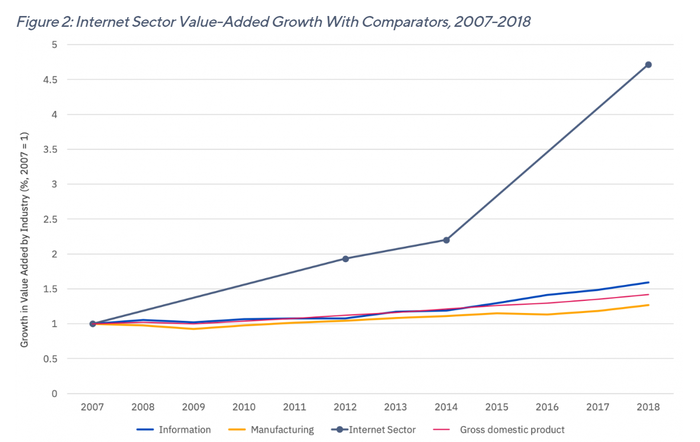The internet is now 10% of US economy: a regulatory conundrum
Placing more stringent regulations on a sector is a delicate equation to balance, especially when it contributes so much to the national economy.
September 27, 2019

Placing more stringent regulations on a sector is a delicate equation to balance, especially when it contributes so much to the national economy.
According to estimates from the Internet Association, the industry now accounts for 10.1% of the overall US economy, directly employing 4% of the working population and indirectly supporting a further 8.7%. These are the figures which have placed the politicians in such a precarious position.
Silicon Valley is driving progress in the US, however it has arguably become too powerful. The years of the ‘Wild Web’ cannot be allowed to continue, though politicians and regulators have to be careful when designing and placing the shackles on these monstrous companies; the last thing anyone wants is to inhibit or undermine an industry so important to economic growth.
Over the course of 2018, the Internet Association estimates the industry contributed $2.1 trillion to the US economy. This is more than double the $966 billion from five years ago, accounting for as much as 10.1% of the total. The number of jobs it also supports has doubled from 2014, directly employing 6 million individuals, while 13.1 million jobs were indirectly supported by the internet companies.
In comparison to other segments, the internet sector grew nine times faster than the US economy as a whole between 2012 and 2018. Since 2007, the US economy has grown by 41.8% compared to growth of 372% for the internet’s contribution. It is now the fourth largest sector in the US, only behind manufacturing, public administration and real estate.
And some might suggest this is only the tip of the iceberg. As more digital products and innovations are introduced, alongside more traditional aspects of our daily lives heading online, growth would presumably only head one direction.
As mentioned beforehand, this presents a conundrum to the politicians and regulators.
It has become increasingly popular over the last few months to point the finger of accusation at Silicon Valley. According to the politicians, these are companies who are navigating around the rules, ignoring the privacy rights of citizens and offering the opportunity for nefarious actors to trick, con and mislead.
Everyone realises the internet economy has to be brought under control through a stricter regulatory regime. The companies involved have not been responsible enough with the light-touch regulatory environment which has been afforded to them, however the iron fist of regulation cannot strike too hard. This is an industry which is thriving and adding so much value to the US economy, and subsequently, society.

If the US is to maintain its leadership position in the global economy, the internet industry is critically important, likewise the telecommunications industry.
5G is a topic which is dominating the headlines and will continue to do so. Those who harness the connectivity euphoria earliest could dominate the international markets for decades to come.
Launching 5G first is not necessarily anything to shout about, but the nation which can scale these networks the quickest will put themselves in an excellent position. Soon enough, the innovators will start to think of new products and services which have been enabled by 5G, irrelevant to whether they are consumer or enterprise focused, though the success of these products will depend on how widespread 5G connectivity actually is.
If you don’t have a large enough 5G network, these innovators cannot test their new ideas at scale, validate business models, or make the necessary tweaks to protect their investment from fast-followers. This concept was very evident in the 4G era.
The idea of Facebook as a mobile product or Uber did not exist until the 4G networks had scaled. There are numerous other examples, though these two are the most obvious. Once 4G networks and devices had been adopted by the mass market, these companies grew rapidly, contributing notably to the US economy.
Let’s compare this to a country which was slow to scale 4G networks. Someone might have had the same idea as Uber founder Travis Kalanick in the UK let’s say, but without the scaled 4G network, the idea couldn’t be validated or test properly, funding would have been more difficult to secure, domestic growth would have been stifled and less funds would have been available for international expansion. By the time the UK version was ready to push out internationally, it might have been so far behind Kalanick in the US the business died.
We have of course made this comparison up, but it proves a point of the importance of scaling the network, not just being the first to launch commercial services.
The same could be said about 5G networks. New businesses will emerge with this new connectivity dynamic, but where will the best ideas have the opportunity to scale domestically, before launching an assault on the global markets. Another interesting element is the attraction of foreign dollars. It you have the best network, you will lure R&D investments to the country from the likes of China, Germany and the UK. How many companies have a R&D centre in Silicon Valley nowadays?
All of these ideas will contribute to the success of the internet economy in the US.
However, the industry is at a critical point. It is facing a regulatory crack-down and 5G is quickly developing all around the world. Politicians and regulators need to create new rules to govern and force accountability, though they need to be careful they do not shackle an industry which is providing so much stimulus to the national economy.
About the Author
You May Also Like












_1.jpg?width=300&auto=webp&quality=80&disable=upscale)
